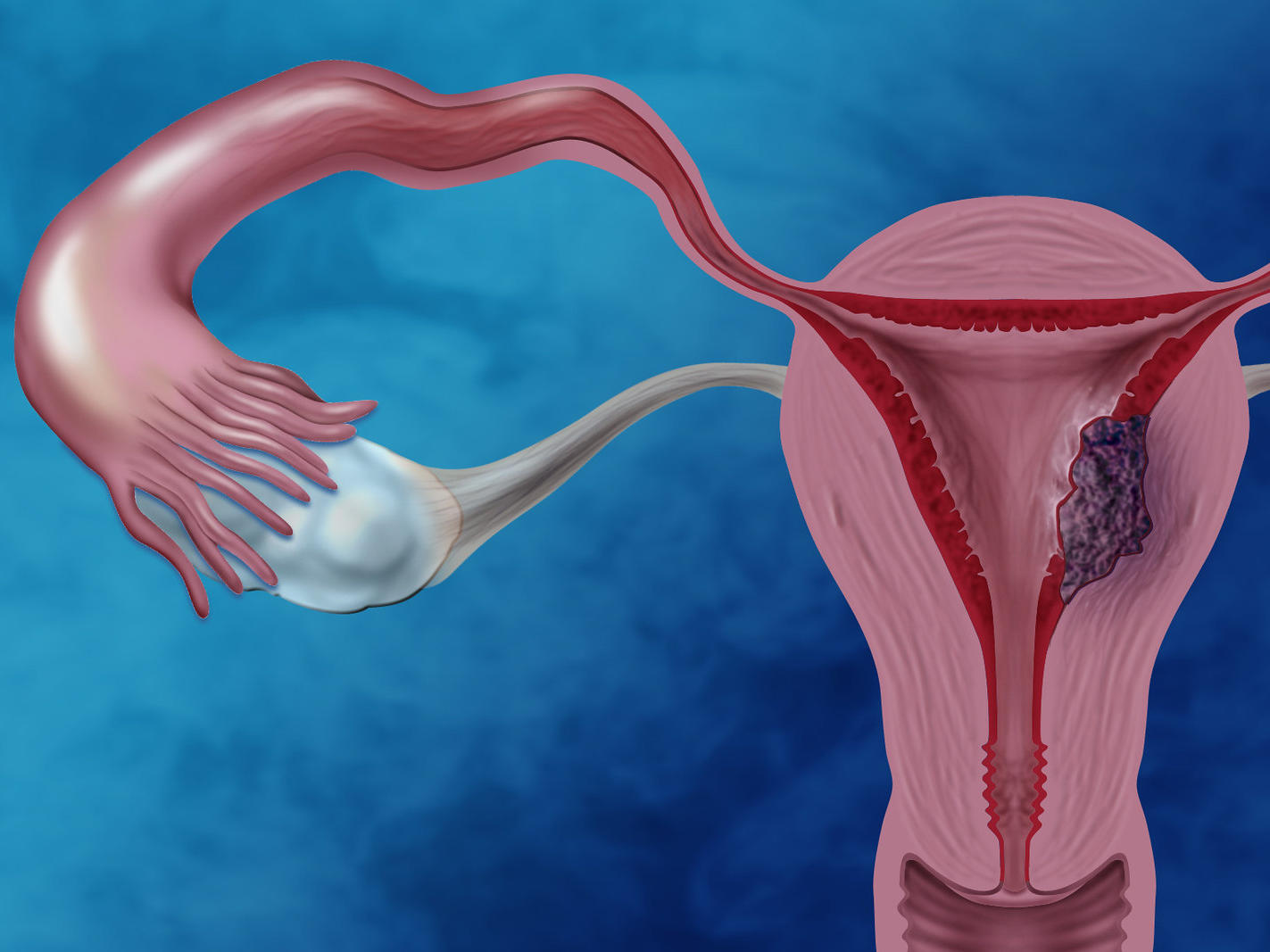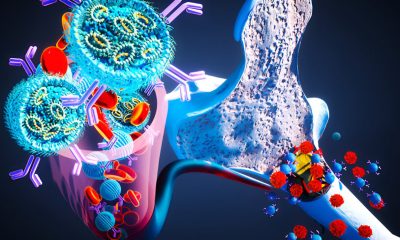Health
Rise in uterine cancer linked to pesticide exposure
Published
2 years agoon

A study published in Environmental Health finds occupational (work-related) exposure to pesticides increases the risk of endometrial (uterine) cancer development.
Endometrial cancer is the most common cancer of the female reproductive system and the fourth most common cancer among women, primarily affecting the uterine lining rather than the uterus itself, like uterine sarcoma.
Despite data predicting the disease rate to increase, few studies evaluate the connection environmental contaminants have on endometrial cancer occurrence.
Like most cancers, non-genetic factors account for a majority of endometrial cancer risk, including diabetes, age, contraceptive (birth control) use and hormone (endocrine) disruption.
However, 3% of all cases are hereditary, primarily from Lynch syndrome. The study notes, “Identifying other modifiable risk factors may help develop strategies to reduce the expected increasing incidence of these neoplasms.”
Many pesticides have a long history associated with endocrine-disrupting properties that induce various molecular changes, prompting disease development. The International Agency for Research on Cancer classifies many of these chemicals as potent carcinogens in animal studies.
Cancer development also depends on genetic susceptibility, as impaired genes responsible for xenobiotic detoxification (elimination) increase disease risk sensitivity.
READ ALSO: Young people dying of cancer at ‘explosive’ rates, data shows
Adding to the science, a review published in Environmental Exposure, Biomonitoring, and Exposure Assessment highlights how specific estrogen-mimicking pesticides increase the risk of disease, particularly hormone-related cancers among women (e.g., breast, ovarian, endometrial cancer) and men (e.g., testicular, prostate cancer).
Endocrine disruptors, including many pesticides, are xenobiotic (i.e., chemical substances foreign to an organism or ecosystem).
Many reports demonstrate that exposure to endocrine-disrupting chemicals can adversely affect human, animal — and thus environmental — health by altering the natural bodily hormones responsible for conventional reproductive, physical and mental development.
Endocrine disruption can lead to several health problems, including hormone-related cancer development (e.g., thyroid, breast, ovarian, prostate, testicular, reproductive dysfunction and diabetes/obesity that can span generations.
Therefore, studies related to pesticides and endocrine disruption help scientists understand the underlying mechanisms that indirectly or directly cause cancer, among other health issues.
Using a questionnaire and job-exposure matrix in the screenwide case-control study, the study analyzed the association between occupational exposure to pesticides and endometrial cancer.
READ ALSO: Breast cancer remains major cause of death among Nigerian women
The data includes 174 consecutive incidents of endometrial cancer cases and 216 controls of the individuals occupationally exposed to pesticides, whether fungicides, herbicides or insecticides; there is a positive association with endometrial cancer.
Although past exposure shows a higher occurrence of endometrial cancer, this can be explained through the latency (delayed) development of cancer, as the illness is primarily chronic. As for occupation, agricultural jobs have a higher association with cancer prognosis than custodial jobs (e.g., disinfectants).
The connection between pesticides and associated cancer risks is not a new finding. Many pesticides are “known or probable” carcinogens (cancer-causing agents), and widespread uses only amplify chemical hazards, adversely affecting human health.
Several studies link pesticide use and residue to various cancers, from the more prevalent breast cancer to the rare kidney cancer, nephroblastoma (Wilms’ tumor).
Sixty-six percent of all cancers have links to environmental factors, especially in occupations of high chemical use. At least 45 different cancers have associations with work-related chemical exposure.
Although the link between agricultural practices and pesticide-related illnesses is stark, over 63% of commonly used lawn pesticides and 70% of commonly used school pesticides have links to cancer.
Many cancer-causing substances are endocrine disruptors, directly affecting traditional endocrine glands and their hormones and receptors (e.g., estrogens, anti-androgens, thyroid hormones) while greatly influencing hormone cancer incidents among humans (e.g., unrein, breast, prostate and thyroid cancers).
READ ALSO: Pat Utomi opens up on struggles with Cancer
Moreover, several studies and reports, including U.S. Environmental Protection Agency data, identify hundreds of chemicals as influential factors associated with hormone-related cancer risk.
This study is one of the first to evaluate the association between work-related exposure to pesticides and endometrial cancer, accounting for confounding factors like age, comorbidities (presence of multiple health conditions) and medication.
Additionally, the study highlights potential mechanisms involved in disease development, including oxidative stress, disruption of enzymatic activity and epigenetic changes from pesticide exposure.
However, the specific molecular pathway needs further investigation. Similarly, external factors such as exposure rate, pesticide type and pesticide (including breakdown product) persistence in the organism can play a role in carcinogenicity (cancer development).
There is a lack of understanding of the etiology of pesticide-induced diseases, including predictable lag time between chemical exposure, health impacts and epidemiological data. Exposure to pesticides can increase the risk of developing chronic illnesses.
Cancer is one of the leading causes of death worldwide, with over eight million people succumbing to the disease every year. Notably, the International Agency for Research on Cancer predicts an increase in new cancer cases from 19.3 million to 30.2 million per year by 2040.
Therefore, studies related to pesticides and cancer will aid in understanding the underlying mechanisms that cause the disease. Consequently, it is essential to understand the health implications of pesticide use and exposure for humans, particularly when pesticides increase chronic disease risk.
Beyond Pesticides tracks the most recent news and studies on pesticides and related topics through the Daily News Blog and Pesticide-Induced Diseases Database (PIDD).
You may like


New prostate cancer cases to double by 2040 – Study


Young people dying of cancer at ‘explosive’ rates, data shows


Breast cancer remains major cause of death among Nigerian women


Scientists develop RNA-based drug to destroy cancer cells in bone marrow


After spending millions, Nollywood actress dies of cancer


I will fight this cancer – Aisha Buhari
Trending

 Entertainment5 days ago
Entertainment5 days agoSimi addresses resurfaced 2012 tweets amid online backlash

 Comments and Issues1 week ago
Comments and Issues1 week agoNigeria’s Declining Oil Output and Soaring Foreign Portfolio Investment Inflow

 Comments and Issues1 week ago
Comments and Issues1 week agoEx-prince Andrew’s arrest, lessons for Nigeria

 Health7 days ago
Health7 days agoSCFN, LUTH introduce bone marrow transplants as curative treatment for sickle cell

 Comments and Issues1 week ago
Comments and Issues1 week agoThe Seyi Tinubu’s jellof rice, loaves of bread

 Health3 days ago
Health3 days agoDeclassified CIA memo explored concealing mind-control drugs in vaccines

 Football7 days ago
Football7 days agoHarry Kane nets brace as Bayern edge Frankfurt 3–2 to go nine points clear

 Football7 days ago
Football7 days agoLate Flemming header stuns Chelsea as Burnley snatch 1–1 draw at Stamford Bridge

